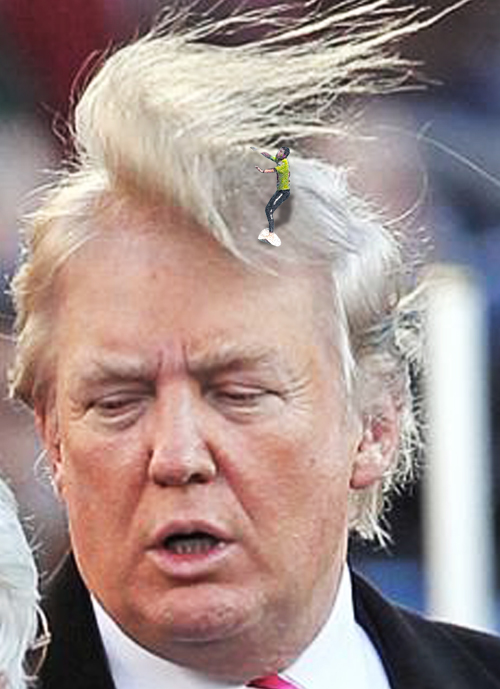
Donald Trump speaks at the 2015 Conservative Political Action Conference (CPAC) at the Gaylord National Resort & Convention Center at National Harbor MD on February 27, 2015. (Photo by Jeff Malet)
When I first saw the news that Donald Trump wanted to ban all Muslims from coming to America (“a total and complete shutdown“), I scratched my head.
Was this a parody or the real thing? As he utters more and more outrageous and bigoted comments, it becomes difficult to know.
But the bigger issue, lurking in the backs of many minds, was this: Will Trump claim one day that his whole campaign was an elaborate hoax, concocted to expose the bigotry and racism of others?
Or, perhaps, as some have said, this is a “false flag” campaign to help Hillary Clinton.
These related ideas seem to be far more reasonable at this point, than this being an actual campaign to become president. Because other than the overt Archie Bunker bigots, there isn’t anyone else that would vote for him.
Would anyone really be surprised if he turned around one day and said, “Ha! The joke’s on you! Look at all those extremists out there that I have uncovered!” (Always done with exclamation marks, of course.)
The problem is that, if he tries it, he runs headlong into an altogether different problem. In federal court. Where judges might not find the humor in what he claims he had done.
Remember, if you will, that in July Trump filed a $500M defamation and breach of contract lawsuit against Univision, a Spanish language station. The station dumped Trump’s Miss USA and Miss Universe contests, after his comments about Mexicans being rapists.
That case was then removed from New York’s state court to federal court where a motion to dismiss by Univision is now pending.
So what happens if Trump tries to claim that his campaign was just a giant ruse to expose the ugly underbelly of American bigotry and racism? Or that he deliberately mocked the worst part of the Republican base with his bigoted comments to help Hillary? It means he will have effectively conceded that, by bringing the lawsuit, he had committed a fraud on the court.
And you know what? Judges don’t like to see their courts used in that fashion.
While the sanctions of case dismissal and legal fees may be a drop in the bucket at this early point in that litigation, courts retain an inherent power to police themselves. And that inherent power includes the imposition of sanctions for bad-faith conduct, which is not displaced or limited by any particular sanction scheme set forth by statutes and rules. (See Chambers v, NASCO).
The sanctions could also affect his lawyers for having perpetuated a charade on the court. And not just monetary ones, but disciplinary ones. Which lawyers want to risk their licenses for Trump?
And since he is involved in dozens of other lawsuits, there could be fallout there, as he would have acknowledged dishonesty not just out of court with the hoax, but in court as well. Pulling a joke or hoax to prove a point may well be a fair thing to do, but you can’t involve the courts. Trump, after all, signed the verification to his lawsuit.
So Trump, it seems, doesn’t really have an escape hatch from his bigotry. If he tries to claim it was all a joke, he (and his lawyers) will likely have a very mad judiciary to deal with. And they may not give a damn about confining themselves to the limited amount in legal fees already wasted. If he tries to do this, will a judge decide to test the limits of the power to sanction?

